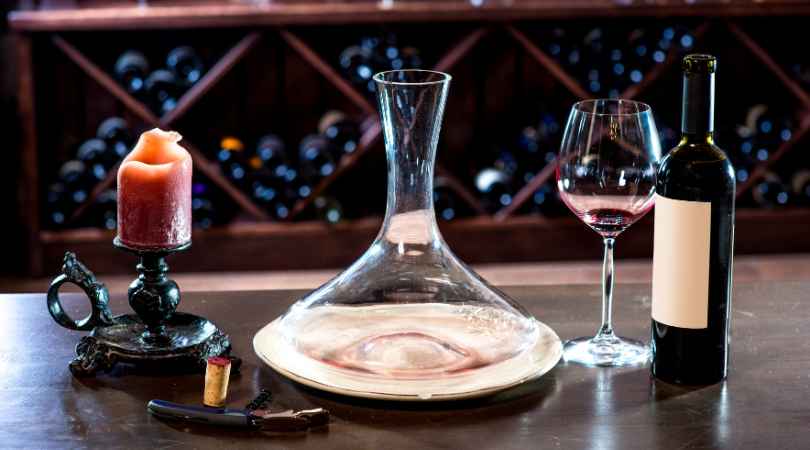
Decanting (aerating) wine is a function that enhances your wine-drinking experience by improving the taste and aroma of wines, red in particular. If you're new to the world of wine decanting, you likely have questions about why and how to decant wine. In this guide, we'll provide you with a comprehensive overview of wine decanting, including the reasons behind it, the process of decanting, and how long to let wine breathe (decant).
What is Wine Decanting?

Decanting is the process of pouring wine from its original bottle into another vessel, usually a glass decanter, to separate the wine from any sediment that may have formed and to aerate the wine, thus enhancing its flavors and aromas. There are two main instances when you would want to decant a wine: the first is to aerate a red wine or port by exposing it to oxygen/air and the second is for separating the red wine or port from its sediment before drinking.
Why Decant Wine and is there a difference between aging and decanting?

- Aerating Young Wines: Decanting young wines allows them to "breathe" and mature faster, enhancing their flavors and aromas. This is especially true for red wines with high tannin content, such as Cabernet Sauvignon, Nebbiolo, and Syrah.
- Separating Sediment: For aged red wines or ports, decanting helps to separate the wine from any sediment that may have formed over time in the bottle, ensuring a smoother and more enjoyable drinking experience.
- Simulating the Aging Process: The overall taste of a wine can often improve with both aging and decanting, but these are two distinctly different processes. Decanting only integrates oxygen into a wine, triggering oxidation and a little evaporation. When you open a bottle of wine, you are experiencing it at a specific stage in its development. The flavors of wine can change over time due to various processes, such as the reaction between acids and alcohols to form new compounds, the dissolution of other compounds, and the combination of these compounds in different ways. While the proportion of alcohol, acids, and sugars remains the same, the flavors can continue to evolve.
- Aging wine is one way to experience these changes in flavor. Aging can make wine morph and change in interesting ways, adding a wrinkle of mystery and complexity to the taste. However, not all wines are suitable for aging, and some may even lose their appeal with age. Vintage wine, in particular, is known for its unique and complex flavors that develop over time.
- Decanting wine is another technique that can enhance the flavor of the wine. Decanting involves pouring the wine into a separate container to separate it from any solids or sediments that may have formed during aging. This process can also have an oxygenating effect on the wine, releasing certain compounds and improving the overall flavor, texture, and aroma. However, decanting is not always necessary or beneficial for every wine, especially older wines that may have already gone through the aging process and developed their full potential.
How to Decant Wine?

- Choose the Right Decanter: A decanter is usually made of glass and is designed to separate sediment and aerate the wine. It typically features a wider base with a narrow neck for pouring and a flat or slanted top. Some decanters also come with a glass top usage for storage of wine that has not been fully consumed.
- Lifting the Bottle: Before decanting a wine or port with sediment, gently lift the bottle and stand it in an upright position for 12 to 24 hours to allow the sediment to settle at the bottom.
- Pour Slowly and Steadily: When decanting a wine or port with sediment, slowly pour the wine or port into the decanter until you begin to see sediment in the neck of the bottle. Stop pouring at this point to avoid transferring the sediment to the decanter.
- Let the Wine Breathe: After decanting a young wine, let it sit in the decanter minimally for 20 minutes to an hour to allow it to aerate and develop its flavors and aromas.
How Long Should I Decant Wine?

The time it takes to decant wine generally is up for debate among wine professionals. Some feel that decanting provides an extra boost of oxygen can open up a wine and give it extra life, while others insist that decanting will make a red wine fade faster. The reason is that they suggest that wine is already exposed to plenty of oxygen when the wine is swirled in your glass. To find the right balance, experiment with multiple bottles of the same wine, decanting them for different lengths of time, and see which you prefer. Just be careful not to decant your vintage wines for too long, as they can quickly become stale (flat) tasting.
Wine decanting is a practice that can enhance your wine-drinking experience by improving the overall taste and aroma of your wine. By following the steps outlined in this blog and experimenting with different wines and decanting times yourself, you can easily become educated at decanting and enjoy your wines to their fullest.



